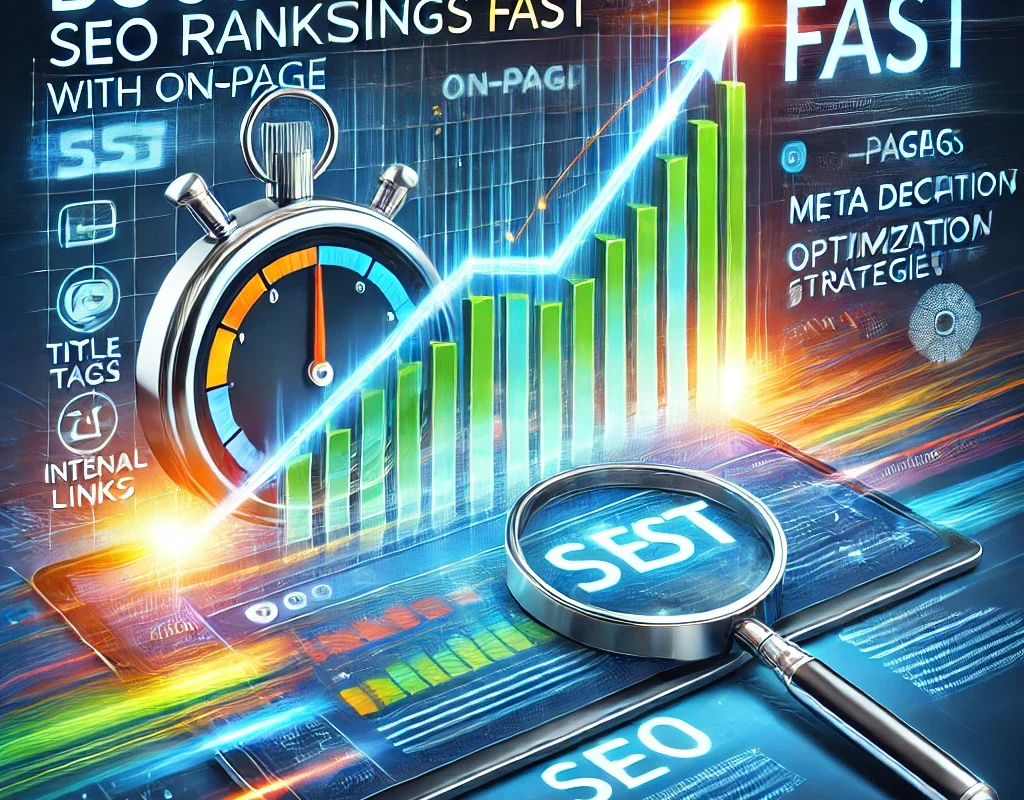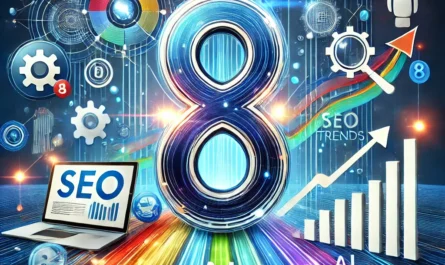In today’s digital landscape, mastering SEO is crucial for anyone aiming to establish a strong online presence. While off-page strategies like link building and social sharing have their place, on-page SEO optimization remains the bedrock of driving organic traffic. So how do you boost your SEO rankings fast? By focusing on mastering on-page SEO today, you can transform your website into a search engine powerhouse. This article will explore the most effective tactics for immediate SEO improvements that will enhance your rankings quickly.
Introduction
With countless websites competing for visibility, it’s critical to ensure your site stands out. On-page SEO focuses on optimizing individual pages to rank higher on search engine results pages (SERPs) while also delivering a positive user experience. From strategic keyword placements to improving page loading speed, mastering on-page optimization can yield swift and lasting benefits. In this guide, we’ll break down actionable techniques to help you boost your SEO rankings fast by mastering these essential elements.
Understanding On-Page Optimization
On-page SEO optimization refers to the practice of optimizing every element on your webpage, from content and HTML code to user-friendly navigation, to improve your site’s search engine rankings. Think of it as creating a perfectly packaged webpage that appeals to search engines and users alike. Optimizing your on-page SEO can help your site rank higher, deliver better content, and increase user engagement, all while ensuring you meet Google’s ever-changing algorithm requirements.
How Does On-Page Optimization Impact Your Rankings?
On-page optimization affects several ranking factors, including content quality, keyword relevance, meta descriptions, and title tags. Additionally, it influences user behavior metrics, such as click-through rate (CTR), bounce rate, and time spent on a page, which are important signals for search engines. Google prioritizes websites that offer value to users and comply with SEO best practices. On-page optimization directly impacts how easily Google can crawl and index your site, assess the relevancy of your content, and rank it against competitors.
Keyword Research: The Foundation of SEO Success
Effective on-page optimization starts with comprehensive keyword research. Understanding what your audience is searching for is key to driving organic traffic. Start by identifying primary and secondary keywords that are relevant to your business. Use tools like Google Keyword Planner, SEMrush, or Ahrefs to find high-traffic keywords with low competition. Long-tail keywords are particularly effective for boosting rankings fast since they target more specific search queries with less competition.
Optimizing Title Tags for Higher CTR
Your title tag is one of the first things users see when they encounter your page in search results. An optimized title tag that includes the main keyword can significantly improve your click-through rate. Aim to keep your title tag under 60 characters to avoid truncation on SERPs. Make sure it’s enticing by incorporating power words like “fast,” “best,” or “ultimate.” For example, “Boost Your SEO Rankings Fast: Master On-Page Optimization Today” immediately conveys value and urgency.
Creating Engaging Meta Descriptions
Though meta descriptions don’t directly impact rankings, they play a vital role in attracting users to click on your link. A compelling meta description can improve your CTR, which in turn signals to search engines that your page is relevant. When writing meta descriptions, include your focus keyword within the first 160 characters and make it actionable. For instance, “Boost your SEO rankings fast with expert on-page optimization tips. Learn key strategies to improve your site’s performance today!”
Using Header Tags to Structure Your Content
Header tags (H1, H2, H3, etc.) are essential for organizing your content in a clear, readable structure. Not only do they improve user experience by breaking up text, but search engines also use them to understand the hierarchy of information on your page. The H1 tag should always contain your primary keyword, as it’s the most important heading for SEO. Subheadings, like H2 and H3, should introduce related content and secondary keywords to further enhance relevancy.
The Importance of URL Structure in SEO
An optimized URL structure is another key element of on-page SEO. Clean, keyword-rich URLs make it easier for search engines to understand what your page is about. Avoid using unnecessary characters or numbers in your URLs. For example, instead of “www.example.com/p123,” opt for “www.example.com/boost-seo-rankings-fast.” Short, descriptive URLs not only look better on SERPs but also improve usability and click-through rates.
Writing High-Quality, SEO-Friendly Content
Content remains king when it comes to SEO. Search engines prioritize content that provides valuable, comprehensive information that answers user queries. Make sure each piece of content you produce is unique, well-researched, and offers real value to your readers. Incorporating your focus and secondary keywords naturally into the text will also help your page rank for relevant search queries. However, avoid keyword stuffing as it can negatively impact your rankings.
Internal Linking for Better SEO Results
Internal linking connects different pages on your website, helping search engines crawl your site more effectively and distribute page authority. When done correctly, internal links guide users to related content, keeping them on your site longer, which improves engagement metrics. For example, linking to related articles or services within your content can offer more value to readers and strengthen your on-page SEO.
Optimizing Images for Faster Load Times and SEO
Images play a significant role in both user experience and SEO. Large, unoptimized images can slow down your page load times, leading to higher bounce rates. To optimize images for SEO, compress them without losing quality and always include alt text that describes the image using your target keywords. This not only helps with SEO but also makes your site more accessible to visually impaired users.
Mobile Optimization: A Must for SEO Success
With mobile traffic surpassing desktop traffic, it’s essential to ensure that your website is mobile-friendly. Google’s mobile-first indexing means that the mobile version of your site is the primary factor in determining rankings. Ensure your site is responsive, loads quickly on mobile devices, and provides a seamless user experience across all screen sizes. Mobile optimization will not only boost your rankings but also enhance user satisfaction.
Page Speed Optimization: Fast Sites Rank Higher
Page speed is a critical ranking factor, and slow-loading pages can severely impact your SEO performance. Use tools like Google PageSpeed Insights or GTMetrix to identify elements that are slowing your site down. Consider implementing strategies like caching, compressing files, and leveraging content delivery networks (CDNs) to reduce load times. The faster your site, the more likely users will stay, reducing bounce rates and improving rankings.
Enhancing User Experience for Better Rankings
Search engines increasingly prioritize user experience (UX) when determining rankings. A well-optimized site that’s easy to navigate and provides valuable content will naturally rank higher. UX factors such as fast load times, intuitive navigation, and mobile responsiveness are crucial for SEO. Additionally, improving your site’s UX can reduce bounce rates and encourage longer session times, which are positive ranking signals.
Schema Markup for Enhanced Search Visibility
Schema markup is a type of structured data that helps search engines understand the content on your site. Adding schema markup to your site can improve your rankings by providing rich snippets in search results, making your listing more prominent and clickable. For example, using FAQ schema can make your page stand out in the SERPs, attracting more clicks and improving engagement.
You can also read; How to Use Content Marketing to Boost Your SEO Efforts
Boost Your SEO Rankings Fast
To boost your SEO rankings fast, it’s essential to focus on both foundational and advanced on-page SEO techniques. Prioritize tasks like keyword optimization, content creation, internal linking, and image optimization to see immediate improvements. Regularly audit your site to identify areas for improvement and stay ahead of algorithm changes. By mastering on-page SEO, you’ll not only see a boost in rankings but also improve the overall user experience, leading to more traffic, engagement, and conversions.



